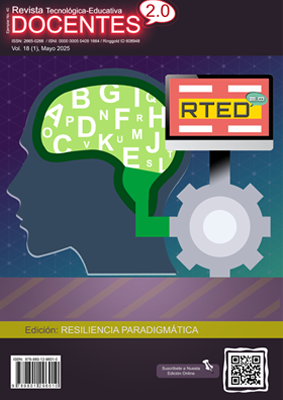This is Metacognition
 DOI:
https://doi.org/10.37843/rted.v18i1.590
DOI:
https://doi.org/10.37843/rted.v18i1.590
Main Article Content
Abstract
To understand metacognitive development, it is essential to explore and analyze the contributions of various theorists who have proposed various channels and guidelines through which human learning develops. The purpose of this study was to deeply immerse themselves in the various theories and concepts about metacognition proposed by scholars through research, ranging from self-regulation and cognitive control to the ability to reflect and monitor one's learning strategies. This essay was framed under the inductive method in the humanistic paradigm, with a qualitative approach of an interpretive type and a narrative topic design. In the study, it was made evident in a series of practical exercises in the development of a partial form in several phases; in the discovery of applied learning to young adolescents in secondary school grade school, their abilities and skills can be observed, as well as the difficulties presented in their development. In conclusion, by integrating these approaches into the design of educational activities, the challenges posed by learning theory are effectively met, and the development of advanced cognitive skills is contributed to. The approach is humanistic, based on the idea that learning should allow students to become critical and reflective individuals capable of transforming social reality.
Downloads
Metrics
Article Details

This work is licensed under a Creative Commons Attribution-NonCommercial-NoDerivatives 4.0 International License.
Those authors who have publications in our journal accept the following terms:
- When a work is accepted for publication, the author retains rights of reproduction, distribution of his/her article for exploitation in all countries of the world in the format provided by our magazine and any other magnetic medium, optical, and digital.
- Authors will retain their copyright and guarantee the journal the right first to publish their work, which will be simultaneously subject to the Creative Commons Acknowledgment License (Attribution-NonCommercial-NoDerivatives 4.0 International (CC BY-NC-ND 4.0)). That allows third parties to copy and redistribute the material in any medium or format, under the following conditions: Acknowledgment - You must properly acknowledge authorship, provide a link to the license, and indicate if any changes have been made. You may do so in any reasonable way, but not in a way that suggests you have the licensor's endorsement or receive it for your use. NonCommercial - You may not use the material for a commercial purpose. NoDerivatives - If you remix, transform, or build from the material, you cannot broadcast the modified material. There are no additional restrictions - You cannot apply legal terms or technological measures that legally restrict you from doing what the license allows.
- Authors may adopt other non-exclusive license agreements to distribute the published version of the work (e.g., deposit it in an institutional archive or publish it in a monographic volume) provided that the initial publication in this journal is indicated.
- Authors are allowed and recommended to disseminate their work through the Internet (e.g., in institutional telematic archives, repositories, libraries, or their website), producing exciting exchanges and increasing the published work's citations.
- Request of withdrawal an article has to be done in writing by the author to the Editor, becoming effective after a written response from the Editor. For this purpose, the author or authors will send correspondence via e-mail: [email protected].
- The author will not receive financial compensation for the publication of his work.
- All Docentes 2.0 Journal publications are under the Open Journal System (OJS) platform at: https://ojs.docentes20.com/.
References
Bentham, J. (1789). An Introduction to the Principles of Morals and Legislation. London: T. Payne. DOI: https://doi.org/10.1093/oseo/instance.00077240
Brown, A. L. (1987). Metacognition, executive control, self-regulation, and other more mysterious mechanisms. In F. E. Weinert & R. H. Kluwe (Eds.), Metacognition, motivation, and understanding (pp. 65-116). Hillsdale, NJ: Lawrence Erlbaum Associates.
Bransford, J. D., Brown, A. L., & Cocking, R. R. (1999). How People Learn: Brain, Mind, Experience, and School. National Academy Press.
Donas S. (1997). Adolescencia y creatividad. https://n9.cl/zj2kv
Esnaola Horacek, G. y Ansó, M. B. (2019). Competencias digitales lúdicas y enseñanza. REIDOCREA, 8, 399-410. http://hdl.handle.net/10481/57800 DOI: https://doi.org/10.30827/Digibug.57800
Gilbert, I. (2005). Motivar para aprender en el aula: las siete claves de la motivación escolar. Grupo Planeta (GBS). https://n9.cl/1te96d
González, A., Bravo, B., & González, D. (2018). El aprendizaje basado en simulación y el aporte de las teorías educativas Learning base don simulation and the contribution of educational theories contenido. Espacio, 39.37.
Hume, D. (1739). A Treatise of Human Nature. John Noon. DOI: https://doi.org/10.1093/oseo/instance.00046221
El Centro IRIS, (2017). La instrucción de matemáticas de alta calidad: Lo que los maestros deben saber. (p.5). https://n9.cl/623av
Flavell, J. H. (1979). Metacognition and cognitive monitoring: A new area of cognitive– developmental inquiry. American Psychologist, 34(10), 906–911. https://doi.org/10.1037/0003-066X.34.10.906 DOI: https://doi.org/10.1037//0003-066X.34.10.906
Locke, J. (1690). An Essay Concerning Human Understanding. Thomas Bassett. DOI: https://doi.org/10.1093/oseo/instance.00018020
Marín, N. (1996). Condiciones fundamentadas de enseñanza-aprendizaje para la resolución de problemas en ciencias. Seminario Preparatorio Doctorado en Educación Área Ciencias Naturales, Universidad Pedagógica Nacional. Santafé de Bogotá.
Paley, W. (1785). The Principles of Moral and Political Philosophy. Faulder.
Perrenoud, P. (2004). Desarrollar la práctica reflexiva en el oficio de enseñar: Profesionalización y razón pedagógica. Graó.
Piaget, J. (1952). The Origins of Intelligence in Children. International Universities Press. DOI: https://doi.org/10.1037/11494-000
Schacter, D. L. (2001). The Seven Sins of Memory: How the Mind Forgets and Remembers. Houghton Mifflin Harcourt.
Secretaría de Educación Pública (2011), Lineamiento para la formación y atención de los adolescentes 2011 guía para el maestro. Educación Básica Secundaria (Primera Edición Electrónica).
Viera, T. (2003). El aprendizaje verbal significativo de Ausubel. Algunas consideraciones desde el enfoque histórico cultural, pp. 37-43. Unión de Universidades de América Latina y el Caribe Distrito Federal, Organismo Internacional.
Vygotsky, L. S. (1978). Mind in society: The development of higher psychological processes. Harvard University Press.
Vygotsky, L. S. (2007). Pensamiento y lenguaje. Editorial Paidós.
Watson, J. B. (1913). Psychology as the Behaviorist Views It. Psychological Review, 20, 158-177. https://doi.org/10.1037/h0074428 DOI: https://doi.org/10.1037/h0074428






